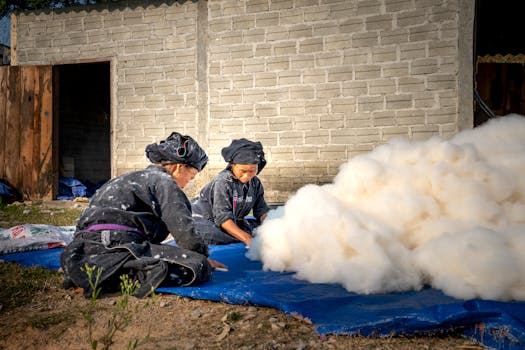
From Cotton to Innovation: How African Fiber Companies are Transforming Textiles
From Cotton to Innovation: How African Fiber Companies are Transforming Textiles. The African textile industry has long been synonymous with cotton production, with countries such as Egypt, South Africa, and Nigeria being among the largest producers of cotton on the continent. However, in recent years, a new wave of innovation has been sweeping through the industry, as African fiber companies look to transform the traditional textile landscape. From sustainable textiles to cutting-edge manufacturing technologies, these companies are revolutionizing the way textiles are produced, consumed, and perceived.
The African textile industry has faced numerous challenges in recent years, including intense competition from Asian markets, high production costs, and limited access to financing. However, despite these challenges, many African fiber companies have refused to give up, instead opting to innovate and diversify their operations. One such company is the Egyptian textile manufacturer, Misr Spinning and Weaving Company, which has invested heavily in sustainable textile production, using environmentally-friendly dyes and reducing water consumption in its manufacturing processes.
The Rise of Sustainable Textiles
Sustainable textiles have become a major focus for many African fiber companies, as consumers increasingly demand more eco-friendly products. Companies such as the South African-based textile manufacturer, Da Gama Textiles, have developed innovative sustainable textile products, such as organic cotton fabrics and recycled polyester fabrics. These products not only reduce the environmental impact of textile production but also provide a unique selling point for companies looking to differentiate themselves in a crowded market.
Another company at the forefront of sustainable textile production is the Nigerian-based fiber company, Fibre and Fabric Limited. The company has developed a range of sustainable textile products, including fabrics made from recycled plastic waste and organic cotton fabrics. These products have not only helped to reduce the company’s environmental footprint but have also provided a new revenue stream, as consumers become increasingly willing to pay a premium for sustainable products.
Innovative Manufacturing Technologies
In addition to sustainable textiles, many African fiber companies are also investing in innovative manufacturing technologies, such as 3D printing and digital printing. These technologies allow companies to produce complex textile designs and patterns quickly and efficiently, reducing production costs and lead times. One such company is the Kenyan-based textile manufacturer, Rivatex East Africa, which has invested in digital printing technology, allowing it to produce a wide range of textile products, from fashion fabrics to home textiles.
Another company embracing innovative manufacturing technologies is the Ghanaian-based fiber company, Printex Limited. The company has invested in 3D printing technology, allowing it to produce complex textile designs and patterns quickly and efficiently. This technology has not only improved the company’s production efficiency but has also enabled it to produce a wide range of textile products, from fashion fabrics to technical textiles.
The Future of African Textiles
As the African textile industry continues to evolve, it is clear that innovation and sustainability will be key drivers of growth. African fiber companies are increasingly recognizing the importance of investing in sustainable textile production and innovative manufacturing technologies, in order to remain competitive in a rapidly changing market. With the rise of sustainable textiles and innovative manufacturing technologies, the African textile industry is poised for a major transformation, one that will not only benefit the environment but also provide new opportunities for economic growth and development.
In conclusion, the African textile industry is undergoing a significant transformation, driven by the rise of sustainable textiles and innovative manufacturing technologies. As African fiber companies continue to innovate and diversify their operations, the industry is poised for a major revival, one that will not only benefit the environment but also provide new opportunities for economic growth and development. From cotton to innovation, the future of African textiles has never looked brighter.




